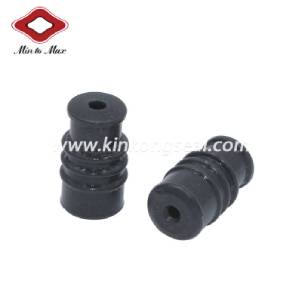Mar. 12, 2020
Automotive wire seals are not so much the latest automotive wire seal materials, in fact, silicon rubber has a history of decades in China. In the past few years, it was indeed the arrogant of rubber, very delicate. In recent years, the cost has gradually decreased, and it has gradually been applied to building seals. The advantage of silicone rubber over ethylene-propylene rubber for sealing is that it has better compression deformation performance than ethylene-propylene rubber, so the sealing performance is better. From the principle of time-temperature equivalent, silicone rubber can withstand temperatures of up to 300°C and resistance to ethylene-propylene At best, the glue is 180 ° C. At the same temperature, the life of silicone rubber is twice that of ethylene-propylene rubber, and the life is longer.
It has excellent physiological inertness, non-toxic and tasteless. Silicone rubber also has excellent heat resistance, cold resistance, dielectric properties, ozone resistance, and atmospheric aging resistance. The outstanding performance of silicone rubber is that it can be used at a wide range of temperatures and can be used in Long-term use at -60 ° C (or lower) to + 250 ° C (or higher). Therefore, silicone rubber is an ideal choice for building seals in the modern era. In short, the times are constantly improving, China's automotive line sealing industry should make a brand, bid farewell to the era of low-price competition, and standardize management. I believe that with the development of China's automotive wire seals, China's automotive wire seal industry will flourish like a bamboo shoots.

Auto Connector Seal
Auto connector seal is a product that seals something so that it is not easy to open, and plays a role in damping, waterproofing, sound insulation, heat insulation, dustproofing, and fixing. Automotive wire seals are made of rubber, plastic, and various materials. Currently, there are five types of automotive wire sealing materials: silicone car wire seals, EPDM car wire seals, TPV car wire seals, TPE car wire seals, and PVC car wire seals. Today I will briefly introduce the advantages and disadvantages of these materials. EPDM automotive wire seals, like PVC products, are not pure EPDM. It also needs to add reinforcing materials, carbon black, clay, etc. to EPDM raw rubber. Processing oil, paraffin oil, naphthenic oil and other materials, vulcanizing agents, auxiliaries and other materials, after mixing, extrusion vulcanization to obtain the final automotive line sealing products.
Due to the special molecular structure of EPDM rubber, it is more excellent in sunlight resistance, oxygen resistance, UV resistance, and resistance than other rubbers often used in the past, such as NR natural rubber, SBR, styrene butadiene rubber, and CR neoprene. Radiation and other aging properties, as well as good mechanical properties, make it quickly seal, especially in the field of automotive sealing systems to replace the above materials, and has been widely used.
Some companies use waste plastics of different quality and complex components to produce automobile line seals, and without adding modifiers and adding fillers at the same time during blending, they become high-filled automobile line seals, which have poor strength and elasticity. Low and easy to break. Some manufacturers have also added trench oils such as aromatic oils or refining residues, which replace plasticizers, so that automotive line sealing products not only have a pungent odor, but also are incompatible with other substances in the short term. They will automatically overflow from the finished rubber strip. Then other substances that lose oil will deform and shrink, become hard and cracked, or even fall off.
Silicone rubber wire seal plays an important role in waterproofing, sealing and energy saving, sound insulation, dustproof, antifreeze and warmth in doors and windows. It must have strong tensile strength, good elasticity, and also need good temperature resistance and aging resistance. In order to ensure the tightness of the rubber strip and the profile, the cross-sectional structure size of the rubber strip must match the profile of the door and window.
Tel: +86 13705057546
E-mail: info@kinkong.com
Add: #27 Hengjing Xiyi Road, Liushi Town, Yueqing City, Zhejiang Province, 325604, China.
Copyright © Min To Max All Rights Reserved |